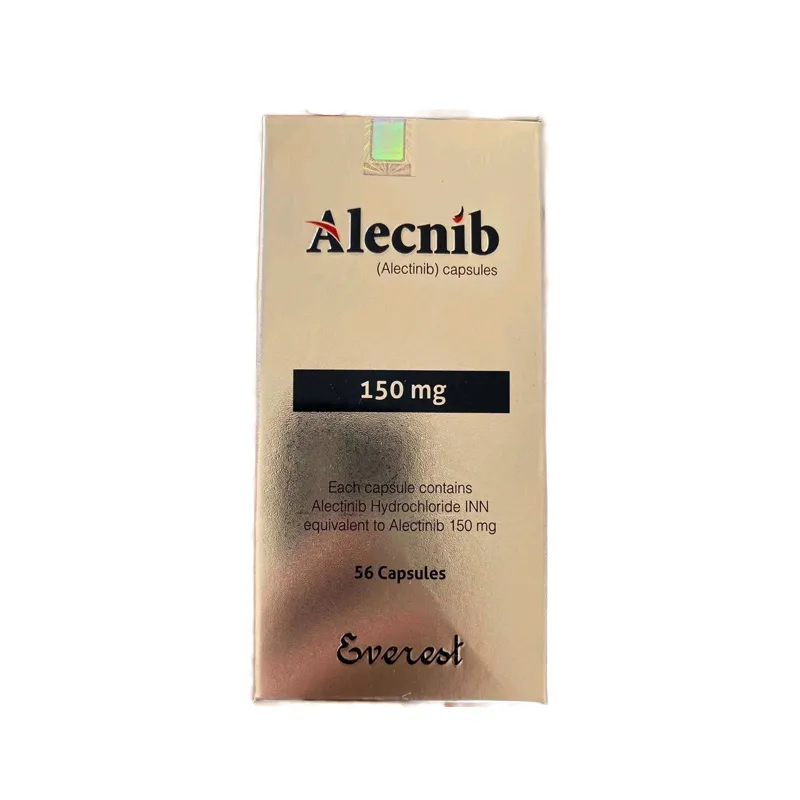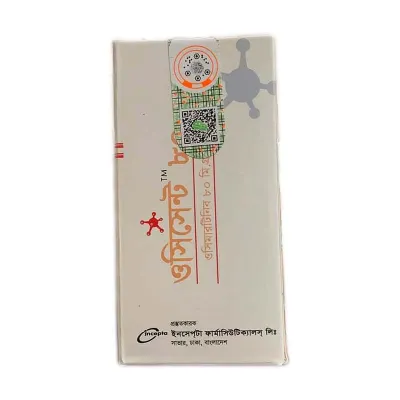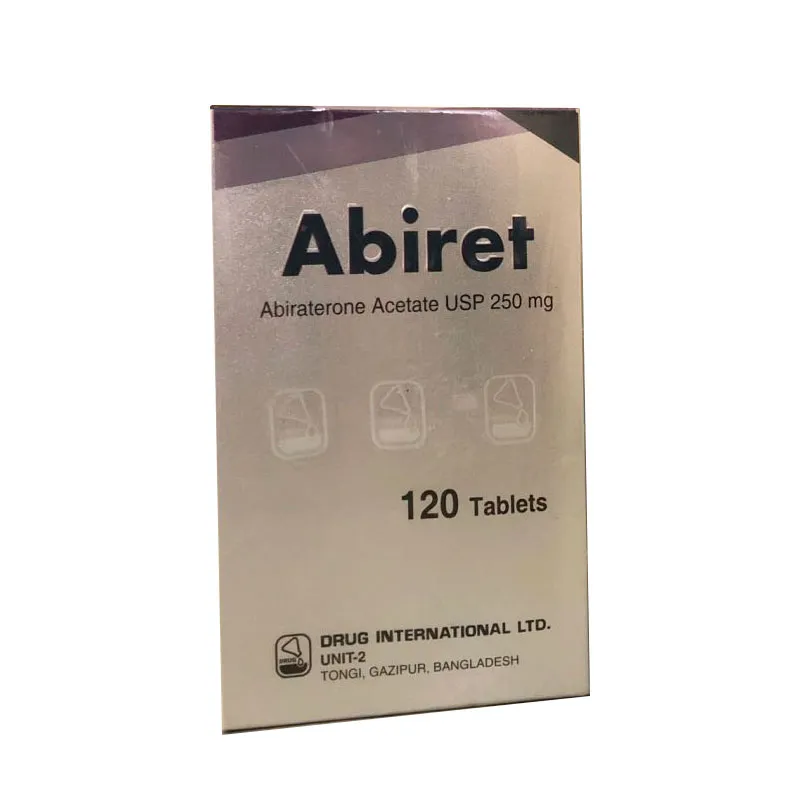Buy Alecnib 150 mg (Alectinib)
Inquire NowTable of Contents
ToggleWhat is Alecnib 150 mg (Alectinib)?
Alectinib (Alecnib) is a medication used in the treatment of certain types of cancer, including non-small cell lung cancer. It is an oral tyrosine kinase inhibitor, meaning it blocks specific enzymes in cancer cells that allow them to grow and divide. By blocking these enzymes, alectinib slows the progression of cancer and helps to shrink tumors. The drug is approved by regulatory agencies such as the US Food and Drug Administration (FDA) and the European Medicines Agency (EMA) for the treatment of people with ALK-positive non-small cell lung cancer who have received prior treatment with crizotinib. Alectinib has been shown to be effective in extending the progression-free survival of patients with this type of cancer, and it is generally well-tolerated with relatively low rates of adverse effects.
Why should you buy the generic Alectinib online?
Buying generic alectinib online can be a cost-effective alternative to purchasing the brand-name drug, as generic drugs are typically less expensive than their branded counterparts. Additionally, online pharmacies may offer more convenient access to medications for those who live in remote or underserved areas, as well as for people who have trouble leaving their homes. If you are considering purchasing alectinib or any other medication online, it’s essential to do your research and only purchase from reputable and licensed online pharmacies. Before making a purchase, it’s also important to consult with your healthcare provider to ensure that the medication is appropriate for you and that you understand how to take it properly.
Composition
Alecnib Capsule: Each capsule contains Alectinib Hydrochloride INN, equivalent to Alectinib 150 mg.
Alectinib Indications And Usage
Alectinib is indicated for the treatment of people with anaplastic lymphoma kinase (ALK)-positive non-small cell lung cancer (NSCLC). It is approved for the following uses:
First-line treatment: Alectinib is indicated for the treatment of ALK-positive NSCLC in people who have not received prior treatment with an ALK inhibitor.
Second-line treatment: Alectinib is indicated for the treatment of ALK-positive NSCLC in people who have progressed on or are intolerant to crizotinib, another ALK inhibitor.
Metastatic NSCLC: Alectinib is indicated for the treatment of people with locally advanced or metastatic ALK-positive NSCLC.
It’s important to note that the use of alectinib should be guided by a healthcare professional who is experienced in the treatment of NSCLC and who has access to the necessary diagnostic tests to determine the presence of the ALK mutation. Additionally, the use of alectinib should be part of a comprehensive treatment plan that includes regular monitoring and assessment of the patient’s condition.
Dosage and administration
The recommended dose of alectinib is 600 mg taken orally twice daily. It should be taken with a glass of water and can be taken with or without food.
It’s important to follow the dosing instructions provided by your healthcare provider, as the dose may need to be adjusted based on individual factors such as side effects, drug interactions, and the patient’s overall health status.
If a dose is missed, the patient should take the missed dose as soon as possible. However, if it is almost time for the next scheduled dose, the patient should skip the missed dose and continue with their regular dosing schedule.
In addition to oral administration, alectinib may be taken in other forms, such as through a nasogastric (NG) tube. If you have questions about the correct administration of alectinib, it’s important to consult with your healthcare provider for specific instructions and guidance.
Special Populations
Alectinib may be used in different populations, but its use may be affected by certain factors such as age, weight, kidney or liver function, and the presence of other medical conditions. Here are some special populations to consider when using alectinib:
Pediatric patients: The safety and efficacy of alectinib in pediatric patients have not been established.
Geriatric patients: No dose adjustments are required for geriatric patients. However, elderly patients may be more sensitive to the side effects of alectinib and may require closer monitoring.
Patients with hepatic impairment: Patients with mild or moderate hepatic impairment should not receive a dose greater than 600 mg once daily. The use of alectinib is not recommended in patients with severe hepatic impairment.
Patients with renal impairment: No dose adjustments are required for patients with renal impairment.
Pregnant and breastfeeding women: The safety of alectinib in pregnant and breastfeeding women has not been established. Women who are pregnant or planning to become pregnant should consult with their healthcare provider before using alectinib.
It’s important to note that this is not an exhaustive list of all the special populations that may be affected by the use of alectinib. For more information on the use of alectinib in special populations, it’s recommended to consult with your healthcare provider.
Contraindications
Alectinib has certain contraindications, which are conditions or circumstances under which the drug should not be used. Here are some of the contraindications for alectinib:
Hypersensitivity: Alectinib is contraindicated in people who have a known hypersensitivity reaction to alectinib or any of its components.
Pregnancy: Alectinib is contraindicated in pregnant women as it may cause harm to a developing fetus.
Lactation: Alectinib is contraindicated in breastfeeding women as it is unknown whether alectinib is excreted in human milk.
It’s important to note that this is not an exhaustive list of all the contraindications for alectinib. Before starting treatment with alectinib, it’s recommended to discuss your medical history and any other medications you are taking with your healthcare provider to determine if alectinib is appropriate for you. If you experience any symptoms of a hypersensitivity reaction, such as difficulty breathing, hives, or swelling, you should seek immediate medical attention.
Warnings and precautions
Alectinib has certain warnings and precautions that should be considered before starting treatment. Here are some of the warnings and precautions for alectinib:
Cardiac events: Alectinib has been associated with QT prolongation and ventricular arrhythmias, including Torsade de Pointes. Patients with a history of QT prolongation or ventricular arrhythmias should use alectinib with caution.
Hemorrhage: Alectinib has been associated with serious and fatal hemorrhages. Patients with a history of bleeding or coagulation disorders should use alectinib with caution.
Interstitial lung disease (ILD): Alectinib has been associated with ILD, including pneumonitis and interstitial pneumonia. Patients who develop ILD should discontinue alectinib and receive appropriate treatment.
Hepatic impairment: Alectinib should be used with caution in patients with mild or moderate hepatic impairment. The use of alectinib is not recommended in patients with severe hepatic impairment.
Drug interactions: Alectinib may interact with other medications, including strong CYP3A inhibitors and inducers. Patients should inform their healthcare provider of all medications they are taking before starting treatment with alectinib.
It’s important to note that this is not an exhaustive list of all the warnings and precautions for alectinib. Before starting treatment with alectinib, it’s recommended to discuss your medical history and any other medications you are taking with your healthcare provider to determine if alectinib is appropriate for you.
Adverse Reactions
Alectinib can cause adverse reactions, which are unintended effects that may occur during treatment. Here are some of the most common adverse reactions associated with alectinib:
Gastrointestinal symptoms: Nausea, vomiting, and diarrhea are the most common gastrointestinal symptoms associated with alectinib.
Fatigue: Fatigue is a common adverse reaction associated with alectinib.
Constipation: Constipation is a common adverse reaction associated with alectinib.
Edema: Edema, or swelling, can occur as an adverse reaction to alectinib.
Myalgia: Myalgia, or muscle pain, can occur as an adverse reaction to alectinib.
Pneumonitis: Pneumonitis, or inflammation of the lung, can occur as an adverse reaction to alectinib.
It’s important to note that this is not an exhaustive list of all the adverse reactions associated with alectinib. Some adverse reactions can be serious and may require immediate medical attention. If you experience any symptoms that are concerning, you should consult with your healthcare provider as soon as possible.
Drug Interaction
Alectinib can interact with other medications and substances, potentially affecting their effectiveness or increasing the risk of adverse reactions. Here are some of the most important drug interactions associated with alectinib:
CYP3A inhibitors: Alectinib is a substrate of CYP3A, and co-administration with strong CYP3A inhibitors, such as ketoconazole, may increase the plasma concentration of alectinib, potentially increasing the risk of adverse reactions.
CYP3A inducers: Co-administration with CYP3A inducers, such as rifampin, may decrease the plasma concentration of alectinib, potentially reducing its effectiveness.
Warfarin: Alectinib may increase the anticoagulant effect of warfarin, increasing the risk of bleeding.
P-glycoprotein (P-gp) inhibitors: Co-administration with P-gp inhibitors, such as verapamil, may increase the plasma concentration of alectinib, potentially increasing the risk of adverse reactions.
It’s important to note that this is not an exhaustive list of all the drug interactions associated with alectinib. Before starting treatment with alectinib, it’s recommended to inform your healthcare provider of all medications you are taking to determine if any interactions exist. If you start taking a new medication while on alectinib, it’s also recommended to inform your healthcare provider to determine if any drug interactions exist.
Use in Specific Populations
Alectinib should be used with caution in certain populations due to the potential for increased risk of adverse reactions or reduced effectiveness. Here are some of the most important considerations for specific populations when using alectinib:
Pregnancy: Alectinib is a pregnancy category D drug, meaning that it may be harmful to a developing fetus. Women who are pregnant or may become pregnant should not take alectinib unless the benefits outweigh the risks.
Nursing mothers: It is not known if alectinib is excreted in human milk. Nursing mothers should not take alectinib or should discontinue nursing while taking alectinib.
Pediatrics: The safety and efficacy of alectinib in pediatric patients have not been established.
Geriatrics: Alectinib has not been studied in patients over the age of 75 years.
Renal impairment: Alectinib has not been studied in patients with severe renal impairment.
Hepatic impairment: Alectinib should be used with caution in patients with mild or moderate hepatic impairment. The use of alectinib is not recommended in patients with severe hepatic impairment.
It’s important to note that this is not an exhaustive list of all the considerations for specific populations when using alectinib. Before starting treatment with alectinib, it’s recommended to discuss your medical history, any pre-existing conditions, and any other medications you are taking with your healthcare provider to determine if alectinib is appropriate for you.
Overdosage
An overdose of alectinib can occur if a patient takes more of the medication than is recommended. Symptoms of alectinib overdose may include nausea, vomiting, diarrhea, and fatigue. In cases of overdose, it is important to seek immediate medical attention.
Treatment for alectinib overdose may include supportive care measures, such as hydration and symptom management. There is no specific antidote for an alectinib overdose. The management of an overdose should be individualized and may include medications to control symptoms, monitoring of vital signs, and other measures as deemed necessary by the healthcare provider.
It is important to always follow the recommended dosing instructions for alectinib and to not exceed the recommended dose. If you suspect an overdose, or have any questions or concerns about the medication, it is recommended to consult with your healthcare provider.
Pharmacological Properties
Alectinib is a tyrosine kinase inhibitor (TKI) that targets the anaplastic lymphoma kinase (ALK) gene, which is frequently rearranged in certain types of non-small cell lung cancer (NSCLC) and other cancers. By inhibiting the activity of the ALK protein, alectinib helps to slow the growth of cancer cells.
Pharmacokinetics: Alectinib is well absorbed after oral administration and reaches peak plasma concentration within 2–4 hours. The elimination half-life of alectinib is approximately 25 hours. Alectinib is primarily metabolized by CYP3A, and its pharmacokinetics are not affected by food.
Mechanism of action: Alectinib is a selective and irreversible inhibitor of ALK, inhibiting the activity of both the native and mutated forms of ALK. By inhibiting ALK, alectinib helps to block the signaling pathways that promote the growth and spread of cancer cells.
Efficacy: Alectinib has demonstrated efficacy in the treatment of ALK-positive NSCLC, including in patients who have developed resistance to previous ALK inhibitors. In clinical trials, alectinib has shown improvements in progression-free survival and objective response rate compared to chemotherapy.
Safety: The most common adverse reactions associated with alectinib include constipation, edema, fatigue, and myalgia. Other adverse reactions may include interstitial lung disease, hepatic dysfunction, and severe skin reactions. It’s important to discuss the potential benefits and risks of alectinib with your healthcare provider before starting treatment.
Pharmaceutical Information
How Supplied
Alecnib Capsule: Each HDPE bottle of Alectinib contains 56 capsules, a silica gel desiccant, and a polyester coil with a child-resistant closure.
Storage
Alectinib should be stored at 20°C to 25°C (68°F to 77°F), with excursions permitted between 15°C and 30°C (59°F and 86°F). It should be protected from light and moisture. It is important to properly dispose of any unused or expired medication, as directed by your healthcare provider or pharmacist. Do not flush medications down the toilet or pour them into a drain unless instructed to do so.
It is important to keep all medications out of the reach of children and pets. If you have any questions about the supply of alectinib, including how to obtain a prescription, it is recommended to speak with your healthcare provider or pharmacist.
How do I buy alectinib online?
It is generally recommended to purchase medications, including alectinib, through a licensed pharmacy with a valid prescription from a healthcare provider. This helps to ensure the safety and efficacy of the medication, as well as to prevent counterfeit or unapproved drugs from being obtained.
To purchase alectinib online, you may need to have a valid prescription from a healthcare provider. Some licensed online pharmacies may allow you to transfer a prescription from your healthcare provider, or may offer the option to have a telemedicine consultation to obtain a prescription.
Additionally, it is important to compare prices and shipping options from multiple online pharmacies, to ensure that you are getting the best value for your purchase. Contact us to know more details.
You must be logged in to post a review.






Reviews
There are no reviews yet.